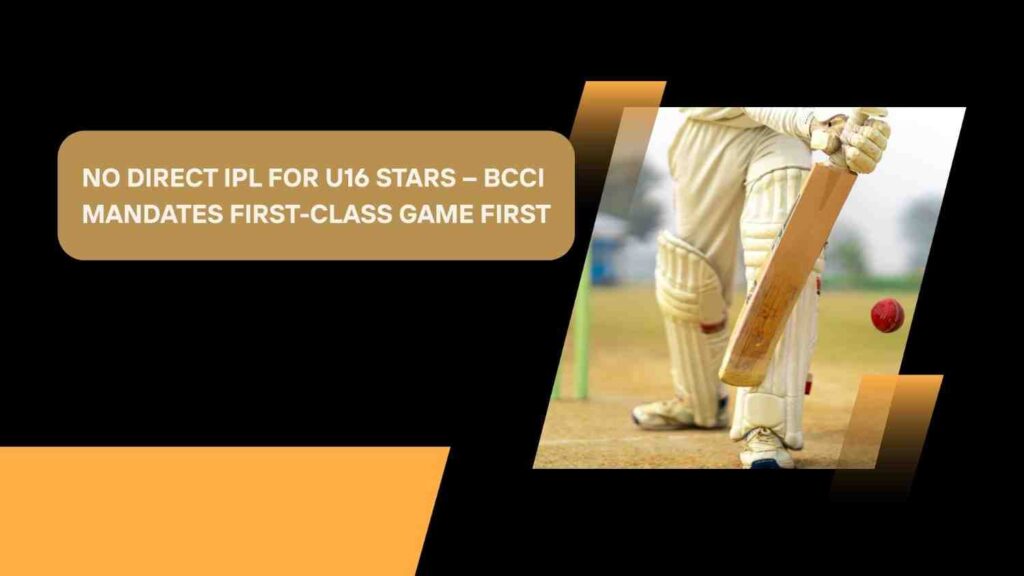BCCI Bars Under-16 Cricketers From IPL Without State-Level First-Class Experience

In a landmark move, the Board of Control for Cricket in India (BCCI) has taken a step that will reshape how young cricketers dream of entering the Indian Premier League (IPL). The board has now made it mandatory for under-16 (U-16) players to play at least one first-class match before they can feature in the IPL or any other domestic T20 league.
This rule, announced during the BCCI Annual General Meeting (AGM) in Mumbai on September 28, is designed to ensure that the next generation of cricketers does not jump straight into the high-intensity world of T20 cricket without first gaining valuable experience in the domestic red-ball format.
Why Did BCCI Make This Rule?
The IPL has become a global cricketing spectacle, with young cricketers eyeing the tournament as their ticket to fame and financial stability. Over the years, several teenagers have entered the league with little to no experience in longer formats. While many have impressed, there has also been a concern that excessive focus on T20s is preventing players from building a solid technical foundation.
According to officials, the new rule will protect youngsters from burnout and help them build maturity, patience, and consistency—qualities that can only come from playing longer formats like Ranji Trophy.
This ensures that by the time a youngster faces the glamour and pressure of IPL, they will already have tested themselves in challenging first-class conditions.
Past vs Present: How the System Worked
Until now, franchises had full control over scouting and signing teenagers. Many players entered IPL straight from age-group cricket, such as U-16 or U-19 tournaments. Some even got contracts without playing a single senior-level domestic game.
- Example: Players like Vaibhav Suryavanshi and Ayush Mhatre made headlines in IPL 2025 despite being only teenagers.
- While these success stories are inspiring, cricket experts often pointed out that skipping red-ball cricket makes players over-reliant on T20 skills and weakens India’s overall cricket structure.
Now, with this rule change, the pathway has been redefined. First-class cricket will be the stepping stone before entering the glamorous world of IPL.
Other Major Decisions at BCCI AGM
The AGM wasn’t only about the U-16 rule. Several other key administrative changes were also finalized:
- Mithun Manhas has been elected as the new BCCI President, replacing Roger Binny. He is the third consecutive former cricketer to lead the board.
- Rajeev Shukla continues as Vice-President, while Devajit Saikia retains his role as Secretary.
- Raghuram Bhat has been appointed Treasurer to oversee financial operations.
- Jayesh George, President of the Kerala Cricket Association, has been chosen as the first-ever Chairman of the Women’s Premier League (WPL).
- Pragyan Ojha and RP Singh, both former India internationals, have joined the Senior National Selection Committee.
- Amita Sharma, a former Indian women’s cricketer, has been named the Chief Selector for the Women’s Team.
Reactions from the Cricketing World
The news has sparked mixed reactions in cricket circles.
Former India cricketer Parvez Rasool welcomed Mithun Manhas’ appointment as BCCI President, calling it a historic moment for Jammu & Kashmir cricket.
“It is a proud moment for all of us. Jammu & Kashmir now has representation in BCCI’s top leadership. We hope this also leads to better cricket infrastructure in the state. The talent is there, but facilities are still lacking compared to other states.”
On the other hand, some franchise scouts believe that the U-16 rule might delay the rise of young prodigies, but even they agree that this will create technically sound, all-format players in the long run.
Impact on Future IPL Stars
For young aspiring cricketers, the message is clear:
- Focus on domestic cricket.
- Perform in Ranji Trophy or similar tournaments.
- Use that as a launchpad for IPL and international cricket.
This means patience will now be key. Instead of aiming straight for T20 leagues, youngsters must first prove themselves in the traditional format.
Cricket analysts believe this could actually strengthen Indian cricket overall, since the country has sometimes struggled with producing consistent Test players while excelling in T20s.